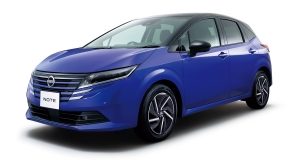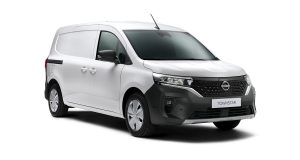NISSAN e-NV200 VAN QUESTIONS & ANSWERS
FIND OUT WHAT IT’S REALLY LIKE TO GO 100% ELECTRIC
GOING ELECTRIC WITH E-NV200
GET THE REAL SCOOP ABOUT
These videos show what real owners are saying about the e-NV200. Below that, you’ll find answers to common questions about what it’s like to ditch petrol for clean electric power.
WHAT ARE THE BENEFITS OF ELECTRIC VEHICLES?
Owning an EV such as the Nissan e-NV200 comes with many financial and environmental benefits, in addition to the convenience and driving experience you can only get from electric power.
FINANCIAL
The e-NV200’s running costs are significantly lower than its petrol or diesel counterparts. Charging at night, when electricity rates are lower, means it costs around HKD$18.35 (or around HKD$25.46) for up to 170km of driving. EV drivers are also exempt from many tax and congestion charges (these vary by country/location), and may also benefit from discounted or free parking in select areas.
CONVENIENCE
Because the e-NV200 can be charged overnight at home or at the office, there’s no need to visit a petrol station for costly fill-ups. Plus, maintenance is easier since there are far fewer moving parts. In fact, the e-NV200 never needs an oil change – or spark plugs, or most other routine maintenance items for that matter – so you’ll experience less downtime.
ENVIRONMENTAL
Unlike hybrids, electric vehicles such as the e-NV200 emit absolutely zero tailpipe emissions. That makes them the most environmentally-friendly vehicles on the road.
REFINED DRIVE
Since e-NV200 doesn’t have an internal combustion engine, you don’t experience engine noise or vibrations, which translates to driving in near silence – and longer periods of time behind the wheel without fatigue. Additionally, floor-mounted batteries provide a low centre of gravity for superior handling, as well as instant torque you’ll feel.

HOW DOES AN ELECTRIC VEHICLE COMPARE WITH A CONVENTIONAL VEHICLE?
Electric and conventional vehicles are mostly very similar – including how they drive. Aside from the obvious difference in drivetrain propulsion, the major differences are the fueling and maintenance requirements of an electric vehicle. Rather than filling up at a petrol station, most EV charging takes place overnight, at home or at the office. Also, electric vehicles have far fewer moving parts compared to traditional vehicles, so maintenance downtime and expense is greatly reduced.
ARE ELECTRIC VEHICLES THE SAME AS HYBRID VEHICLES?
No. Electric vehicles are often confused with hybrid vehicles, which run on a combination of an internal combustion engine and electric motor. By contrast, electric vehicles are solely powered by an electric motor, which means they require absolutely no fuel. And since they emit no emissions, they don’t even have a tailpipe – EVs are the only true zero-emission vehicles.
Photos and information may vary from actual vehicles sold in Hong Kong, and specifications/information are subject to change without prior notice. Please contact Nissan Hong Kong for details.















